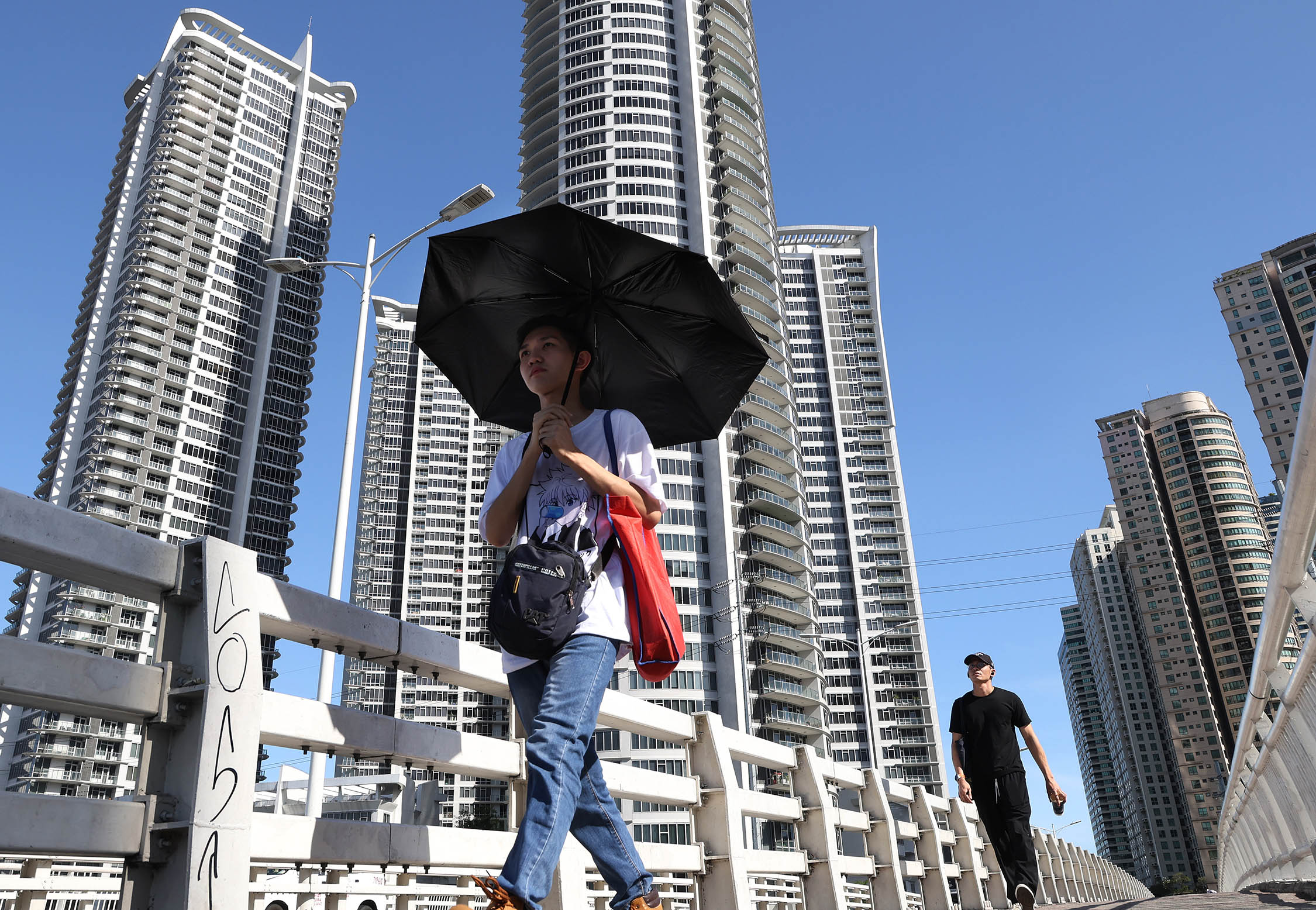Whole PH on power alert as supply dips

HEAT BUSTER A woman crosses the Estrella-Pantaleon bridge in Makati City with an umbrella to protect her from the hot midday sun. MARIANNE BERMUDEZ
MANILA, Philippines — The National Grid Corp. of the Philippines (NGCP) on Wednesday placed the country’s main power grids in Luzon, the Visayas and Mindanao under red or yellow alert because of the continuing shortage in power supply.
The announcement prompted lawmakers from both houses of Congress to urge the Department of Energy (DOE) to explain the situation and remedial measures it was pursuing.
In its latest advisory, the NGCP issued a red alert notice for the Luzon grid that lasted from 3 p.m. to 4:05 p.m. and a yellow alert in the whole of Luzon from 1 p.m. to 3 p.m. and from 4 p.m. to 10 p.m.
It also placed the Visayas grid on red alert status from noon to 5 p.m. and on yellow alert from 10 a.m. to noon, from 5 p.m. to 6 p.m., and from 8 p.m. to 9 p.m.
READ: Luzon placed under red alert for four hours
For the first time this year, the NGCP placed the Mindanao grid under yellow alert status from 10 a.m. to 4 p.m. but it lifted the issuance at 3:09 p.m.
The last time the grid operator issued a red or yellow alert in Mindanao was in 2010 and 2012 due to little to no power reserves to meet increasing demand.
“This is a cause of great concern,” Sen. Sherwin Gatchalian, chair of the Senate energy committee, said in a statement.
READ: NGCP extends red alert in Luzon grid, yellow alert in Visayas
“The DOE should immediately investigate the numerous forced outage of power plants that caused the reduction of supply,” he added.
Gatchalian expressed surprise that even the Mindanao grid was placed on yellow alert considering the “excess capacity” in the South.
“Historically, the month of May is 3 percent to 5 percent higher in terms of demand. That means we’ll experience more brownouts if power plants will not go on line,” he said, adding that the DOE should also investigate the reserves that NGCP should have contracted.
Stricter oversight
Sen. Francis Escudero, for his part, urged the DOE and Energy Regulatory Commission (ERC) to enforce stricter oversight on power generation companies (gencos) to ensure compliance with their scheduled outages.
Additionally, the gencos should be compelled to provide transparent explanations and justifications for any unplanned outages, he said.
Since May last year, the Makabayan bloc of the House of Representatives has been pushing for an inquiry into the power shortage situation, particularly DOE policies relating to new power plants.
The lawmakers said that gencos were not the only ones to blame since more than half of the country’s power plants were over 20 years old, with no increase in plants coming online to meet growing demand.
Offline plants
In Luzon, four power plants have been on forced outage since 2023, on top of four others between January and March this year.
Some 12 power plants went offline this month, while two facilities reduced their output. As a result, the Luzon grid lost 1,840.3 megawatts of supply.
The NGCP said in the Visayas, one plant has been on forced outage since 2022, two facilities since 2023, two plants between January and March this year, and 15 since the start of April.
Eight others are running at reduced capacities, wiping out 621.6 MW of supply to the grid.
In the case of Mindanao, nine plants have been on forced outages since the start of the month, while five others reduced their output, making 673.98 MW unavailable to the grid.
The available capacity in Mindanao is 2,761 MW, as opposed to the peak demand of 2,614 MW.